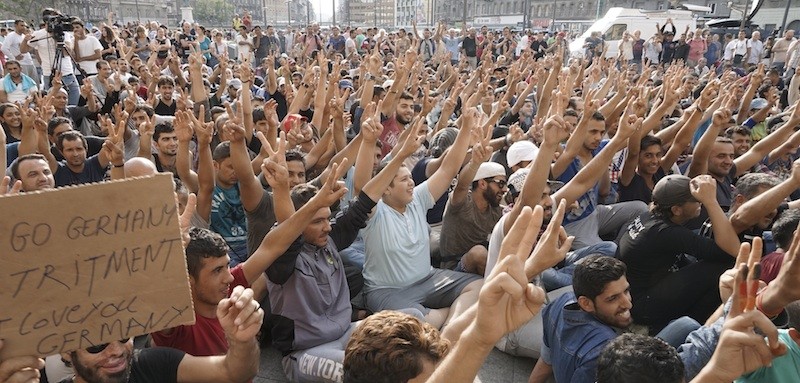
Slovakia will no longer accept Muslim refugees, said Social Democrat Prime Minister Robert Fico, to prevent attacks like the ones in Cologne.
Would you be in favour of a similar decision in Italy?
These are the words that Northern League party leader Matteo Salvini wrote on his Facebook page on January 8, 2016, quoting Slovakian Prime Minister Fico who, earlier this year, announced his firm opposition to the creation of a cohesive Muslim community in Slovakia.
Salvini does not appear concerned about the viability of such a plan. For him, “no Muslim refugees” is a fact. And he has asked his 1.3 million fans whether such a decision would be desirable for Italy as well.
Here at Open Migration, we are asking the question that Salvini isn’t: does international law allow such a selection at the borders of Europe and within Italy?
Analysis
We sought our answer from Gianfranco Schiavone, the vice-president of ASGI, the Association for Juridical Studies on Immigration. «Slovakia has ratified the 1951 Geneva Convention on the Status of Refugees and, as a member of the European Union, is bound to the Treaty of Lisbon, signed on December 13, 2007. Slovakia is also bound to respect the Charter of Fundamental Rights of the European Union – the Charter of Nice – which has the same legal status of the treaties (article 6 of the Treaty), and is therefore fully legally binding for the European institution and their Member States. All these regulations, however different in origins and legal status, are clear and unambiguous in recognizing international protection as an individual right with no distinctions of race, religion, nationality or any other reason».
And the legal expert’s conclusion is just as unequivocal: «The Slovakian Prime Minister’s remarks, in as much as he seems to suggest the possibility of operating a selection among refugees based on their religion, are troubling in the extreme, as they are incompatible with the fundamental principles of both EU law and international law».
Then there have been those, like Lucia Annunziata (editor in chief of Huffington Post Italia), who in the light of the Cologne attacks have proposed the creation of separate reception procedures for refugees entering Europe: one for families, elderly people, women and children; and a second (and longer) one for unaccompanied young men. Schiavone is adamant: “It is absolutely not possible to create separate tracks, for the same reasons cited in the cases of Fico and Salvini».
However, what if the selection among refugees were made not on first arrival, but later on during the relocation process – that is, the programme for the redistribution of refugees throughout Europe that the EU adopted in October 2015? «Member States retain the right to refuse to relocate an applicant only where there are reasonable grounds for regarding him or her as a danger to their national security or public order or where there are serious reasons for applying the exclusion provisions set out in Articles 12 and 17 of Directive 2011/95/EU».
This is why, even in the case of relocation, it is not possible to choose who you let in. «Therefore, – concludes Schiavone – Slovakia cannot arbitrarily “select” candidates to the relocation programme based on their religious faith or other characteristics. Beyond any legal reasoning, anyone can understand the ethical implications in this matter, and every European citizen should be outraged at Slovakia’s refusal».
Our opinion
The idea of selecting refugees on the basis of religion (or gender, or age) is unacceptable on ethical as well as on legal grounds. Since the 1951 Convention, there can be no discrimination in matters of international protection. Therefore, measures like the ones proposed by Robert Fico and Matteo Salvini are impracticable, because they are grounded on false premises.
Twitter: @alessandrolanni









